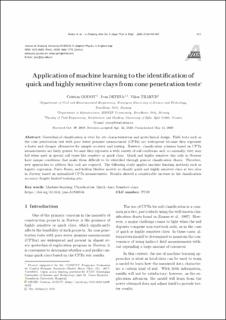Application of machine learning to the identification of quick and highly sensitive clays from cone penetration tests
Peer reviewed, Journal article
Published version
Permanent lenke
https://hdl.handle.net/11250/2671979Utgivelsesdato
2020Metadata
Vis full innførselSamlinger
- Publikasjoner fra CRIStin - SINTEF AS [5801]
- SINTEF Community [2247]
Originalversjon
10.1631/jzus.A1900556Sammendrag
Geotechnical classification is vital for site characterization and geotechnical design. Field tests such as the cone penetration test with pore water pressure measurement (CPTu) are widespread because they represent a faster and cheaper alternative for sample recovery and testing. However, classification schemes based on CPTu measurements are fairly generic because they represent a wide variety of soil conditions and, occasionally, they may fail when used in special soil types like sensitive or quick clays. Quick and highly sensitive clay soils in Norway have unique conditions that make them difficult to be identified through general classification charts. Therefore, new approaches to address this task are required. The following study applies machine learning methods such as logistic regression, Naive Bayes, and hidden Markov models to classify quick and highly sensitive clays at two sites in Norway based on normalized CPTu measurements. Results showed a considerable increase in the classification accuracy despite limited training sets.
